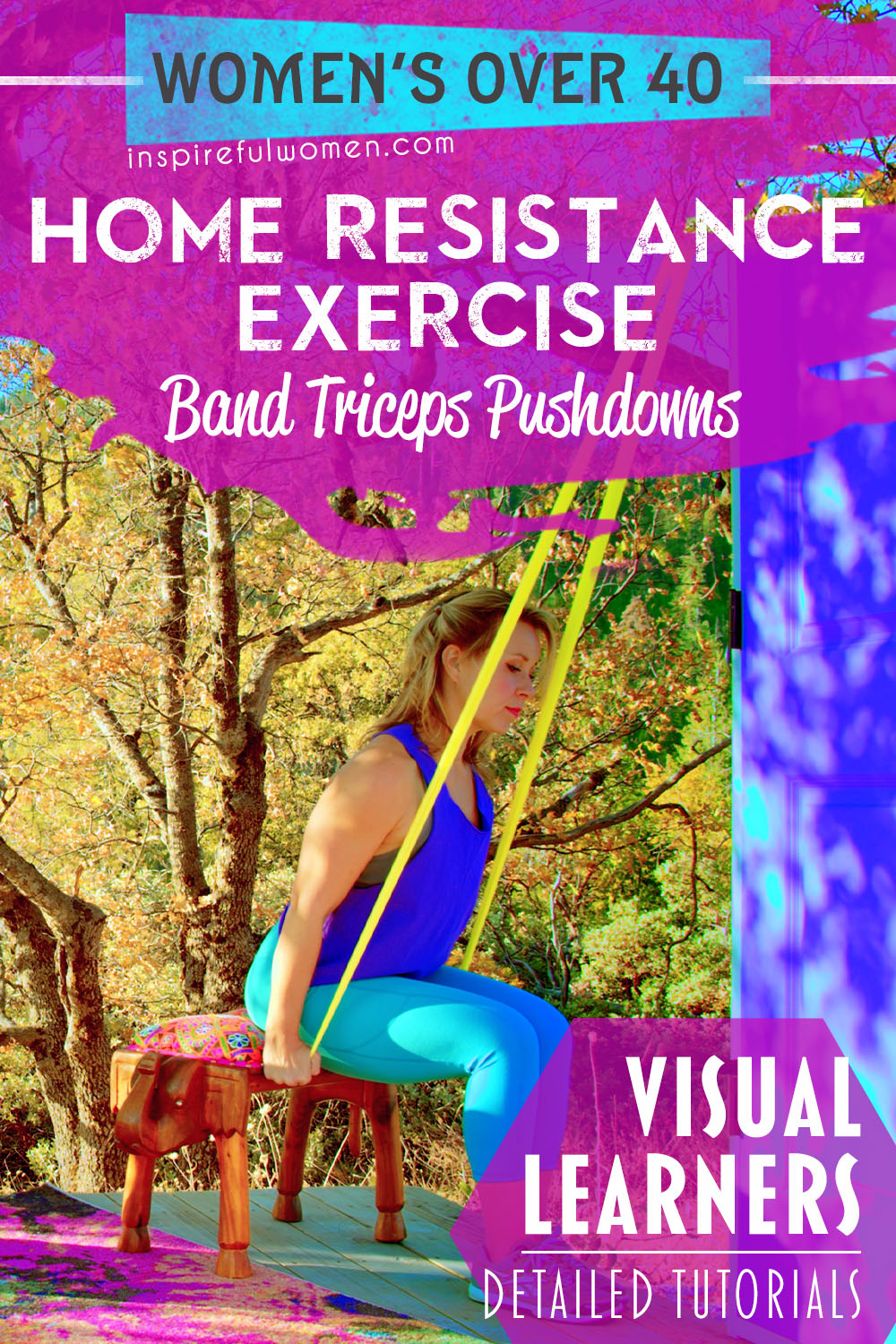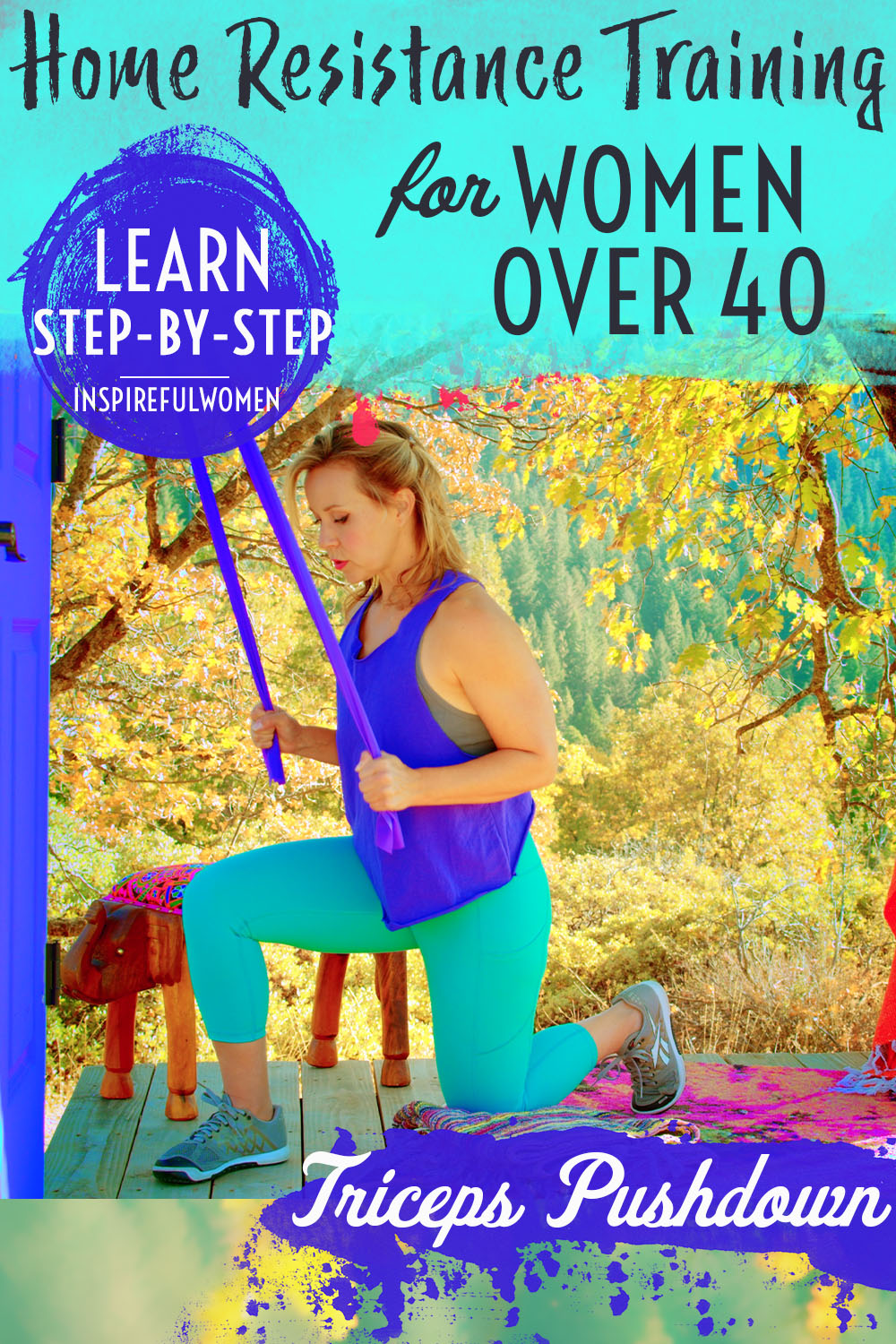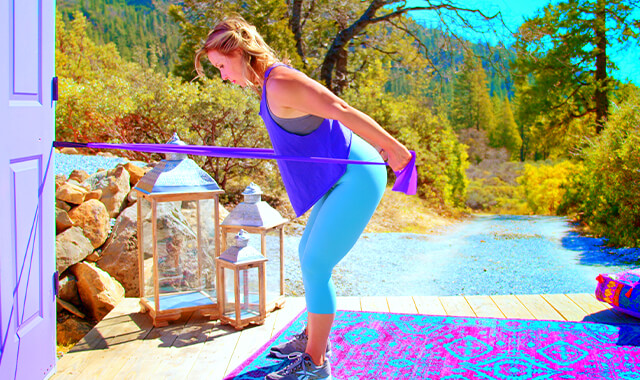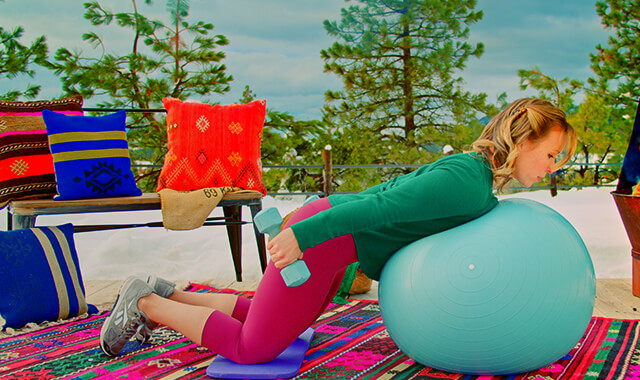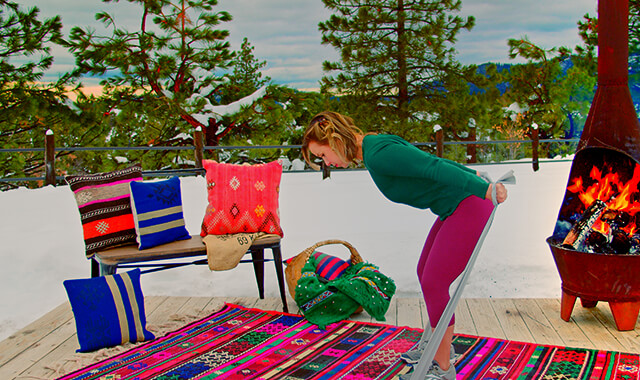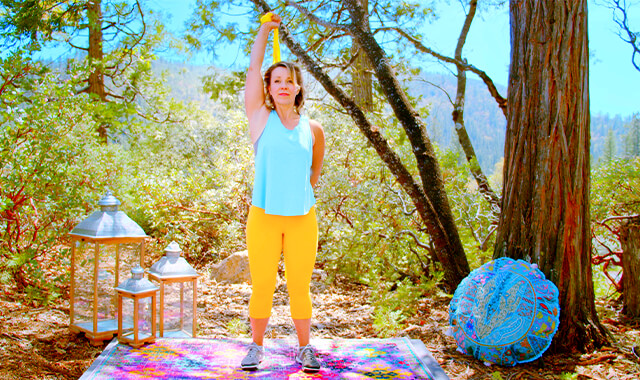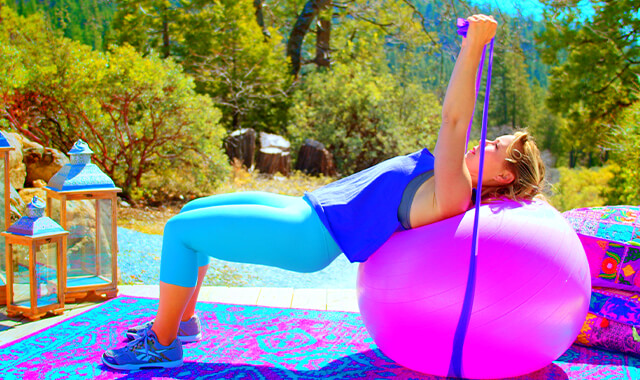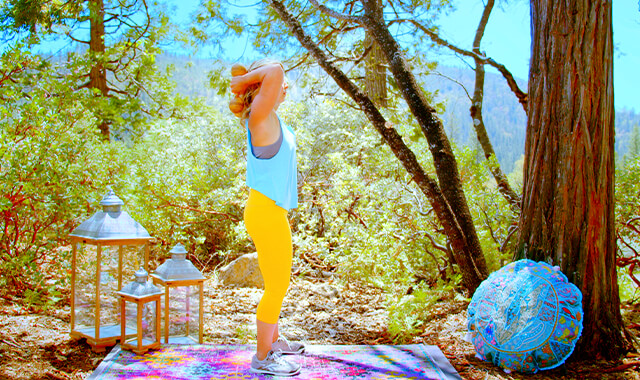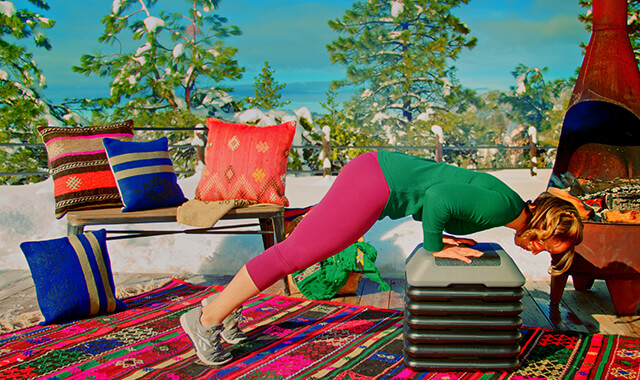Band Triceps Pushdowns
How to Do Easy Band Triceps Push Downs - No Gym - Home Exercise | In-Depth Guide [VISUAL LEARNERS] Beginner
Proper Form, Common Mistakes, Variations + Easier & Harder | Home Resistance Training
WHAT DO YOU WANT TO SEE?
QUICK DEMO
QUICK DEMO
MUSCLES THIS WORKS
MUSCLES
MAIN MUSCLES WORKED IN the Band Triceps Pushdown
Triceps
WHAT WE'RE DOING TODAY
WHAT & WHY
BENEFITS OF TRAINING THE TRICEPS
WHAT
WHAT WE'RE DOING TODAY
ALL WE'RE DOING:
With a band anchored overhead, hold the band and extend your arms downward.
Tricep Pushdowns are a straightforward way of working the muscle on the back side of your upper arm. This is a fantastic way to target and tone those flabby arms while keeping things fun and effective. The main function of this muscle is to straighten your elbow, like the movement that you make to push a door open. This exercise is the compliment to bicep curls - the bicep curl works the muscle on the front of the upper arm and the tricep pushdowns work the muscle on the back of the upper arm. It is important to include triceps exercises if you do bicep curls as part of your workout. Working the muscles on the back and the front of your arm will help to keep the muscles balanced.
There are many options for body position for tricep push downs, but they are all done using a band for resistance. The triceps has three heads. All three heads cross the elbow joint but only one head, the long head, crosses the shoulder joint. Some of the other tricep exercises will also work the long head of the triceps at the shoulder joint, moving or holding your arm back behind your body. For the tricep pushdown exercises, the goal is to keep your upper arm still and isolate all of the movement to just your elbow joints.
When you are using an elastic band, the resistance will be greatest when the band is stretched the longest and you are resisting the band pulling the upper arm forward and bending the elbow. Take a minute to think about your setup before completing the movement.
WHY BOTHER DOING IT?
WHY
WHY DO WE EVEN CARE?
The triceps muscle is the largest muscle of the arm, making up ⅔ of the muscle bulk in the upper arm. The word tricep means that there are three heads (or parts) to the muscle. All three heads of the muscle cross the elbow joint, with their primary function being to straighten the elbow. The long head of the tricep also crosses the shoulder joint. This part of the muscle can also help to pull the upper arm back behind your body. Tricep Pushdowns work all three heads of the triceps and the anconeus - which is a small muscle that help to straighten the elbow. These muscles are also important for stabilizing the elbow joint.
Most joints have muscles on opposite sides that do opposite movements. This is true for the elbow joint - the biceps bends the elbow and the tricep straightens the elbow. Bicep curls are probably one of the most common exercises, and sometimes the triceps are overlooked. Most functional use of the arms requires that the biceps and triceps work together in coordination to control the movement of the arm. Including exercises for both the biceps and triceps can help keep the muscles balanced in order to keep the elbow joint healthy.
The anconeus is a pretty small muscle that crosses the elbow joint. The muscle does not have a lot of power, so it does not contribute much to extension. It does work to stabilize the elbow joint, especially to hold the forearm in a neutral position - between pronation and supination.
EVERYDAY LIFE
EVERYDAY LIFE &
MUSCLE FUNCTION
HOW WE USE OUR Triceps IN EVERYDAY LIFE
1. STRAIGHTENS (EXTENDS) THE ELBOW
- Reaching with a straight arm.
- Pushing a door shut, stroller, shopping cart
- Pushing up from a chair, floor, or lying down- on side
- Sports - provides power for swinging in golf and backhand shots in tennis
- Throwing - when you straighten your elbow
2. HELPS TO STABILIZE THE ELBOW JOINT - DURING ALL ARM USE
- Writing, eating, dressing, using a screwdriver
STARTING POINTERS
Starting Pointers
This is the standard version of the triceps pushdown. It is convenient and very effective - all you need is a resistance band. This exercise works all three heads of the triceps muscle. Working the triceps in a standing position is beneficial because it is how the triceps are used in everyday life. The muscles of the legs and torso will work to maintain good posture, balance and stability as the triceps are working.
HOW TO FEEL WHAT MUSCLE IS WORKING
How to Feel What Muscle is Working
Place the palm of your hand on the edge of a table or the wall with the elbow bent.
Place your other hand on the back of your upper arm.
Lean some of your weight onto the arm, and straighten the elbow. You will feel the triceps activate.
HOW TO DO THE EXERCISE
LOOKS
HOW Band Triceps PushdownS SHAPE OUR BODY
Will tone and shape the triceps which is the biggest muscle of the arm. Can help to reduce flapping upper arms.
PROPER FORM
PROPER FORM: Band Triceps Pushdown
EQUIPMENT, SETS & REPS
EQUIPMENT
Main set (3: Light/Med/Heavy)
X-Heavy Band (I recommend getting this too if you plan to use resistance bands frequently).
SUGGESTED STARTING WEIGHT FOR WOMEN:
Moderate resistance bands
SETS & REPS:
2 sets of 8 reps
PACE:
Moderate
BODY POSITION
BODY POSITION FOR THE Band Triceps Pushdown
BAND: Anchor the band shoulder height or higher, stand facing the band.
FEET: Feet hip width apart, toes pointed forward.
BODY STANCE: Knees slightly bent; hinge forward slightly at the hips; The amount that you hinge forward can vary and is dependent on where your anchor is relative to your body. Good posture - neutral spine, shoulder blades in and down the back, sternum lifted.
HAND/GRIP: Palms will face each other (Neutral grip) - your tricep works the same regardless of supination or pronation, so use a comfortable grip. Hold one end of the band in each hand. Wrapping the band around your wrist and your palm can be more comfortable and help to stabilize your wrist.
ARMS: Elbows bent approximately 110 - 90 degrees, upper arm in line with or just behind your torso. Adjust your position so that the band is taut with your elbows bent.
HOW TO DO
HOW TO DO Band Triceps Pushdowns
CUE: All movement is isolated to your elbow joint.
Pull down until your elbows are straight, and your hands will end beside your hips.
Slowly return to the starting to begin the next rep.
HOW TO SAFELY GET OUT OF THE EXERCISE
Step forward to put slack in the band and release the ends of the band.
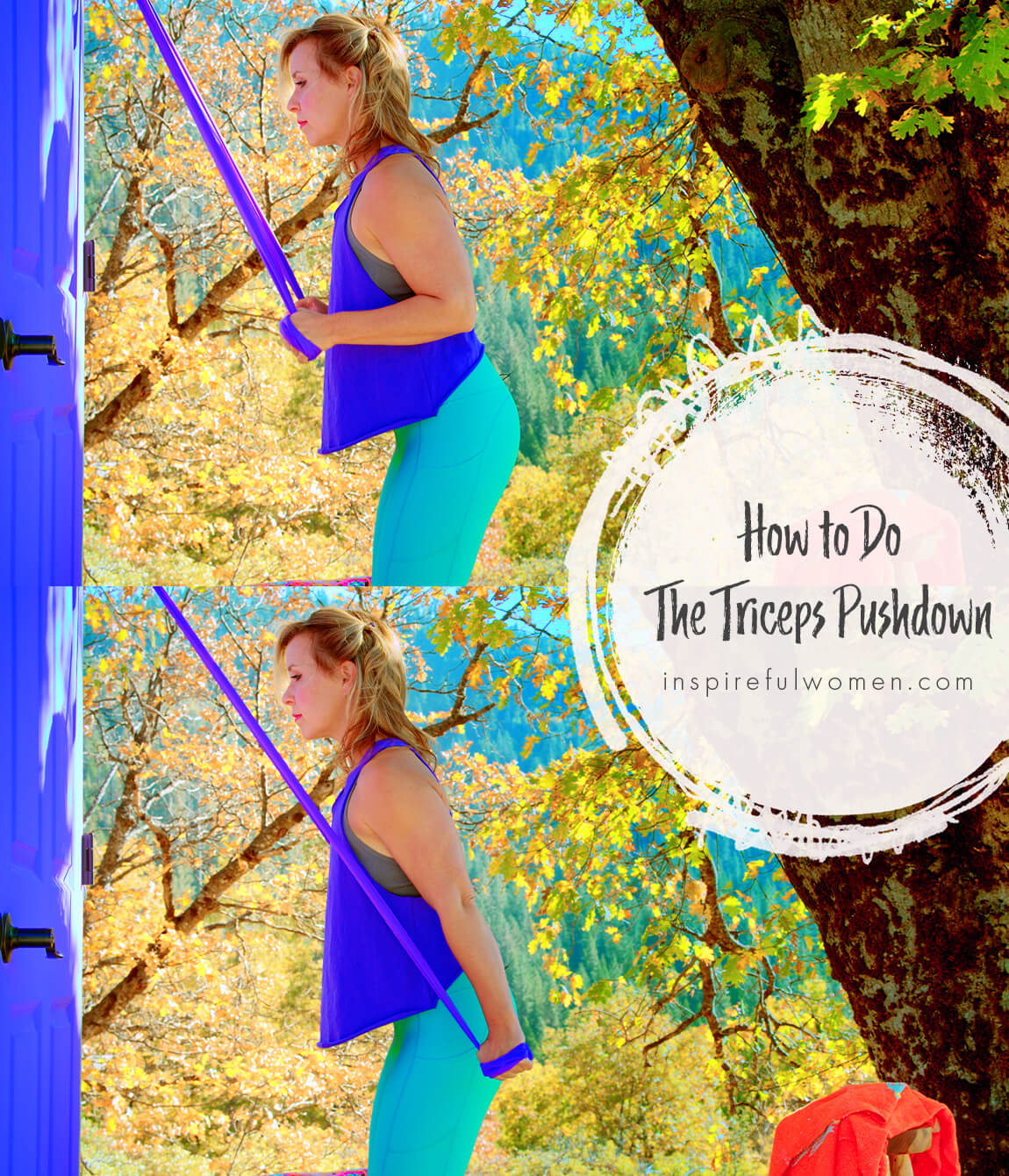
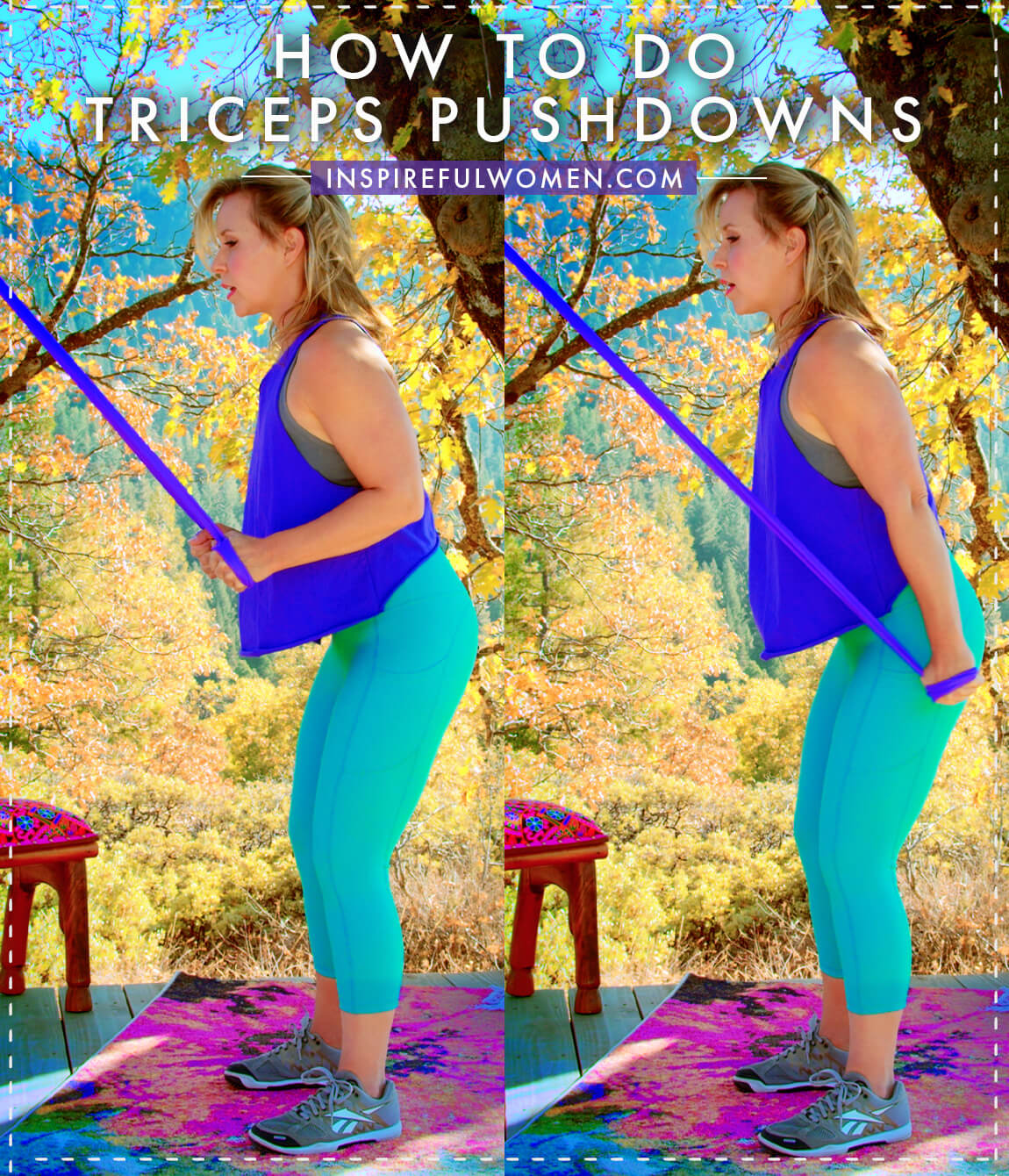
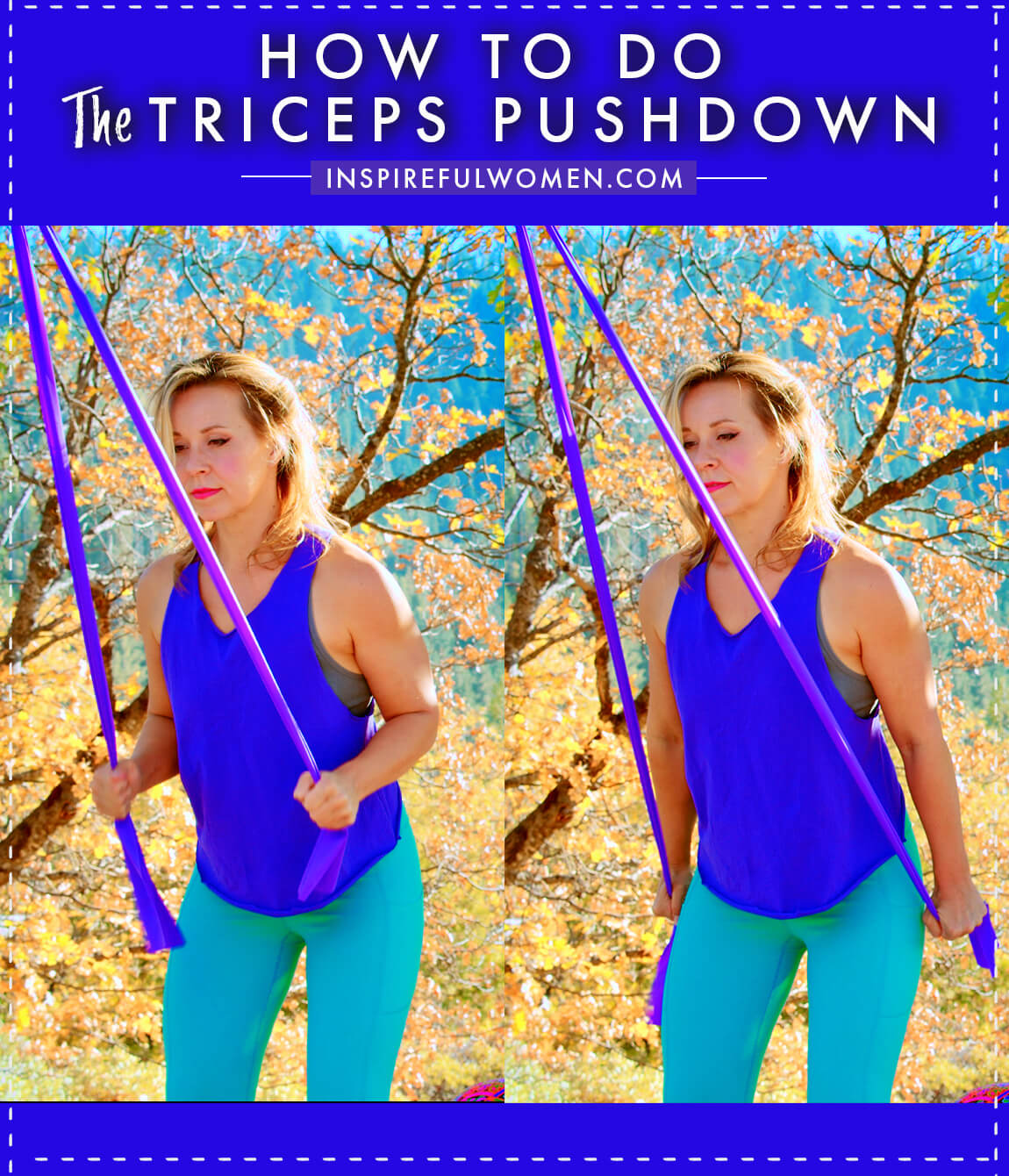
COMMON MISTAKES
COMMON MISTAKES
WHAT TO AVOID WITH THE Band Triceps Pushdown
KEY TIP:
Guess what? Good news! Many avoids are the same for most movements. Once you learn the basics, there's really only a few extra avoids for each individual movement.
1. Avoid Shoulders Rounding Forward
AVOID: Shoulders rounding forward or forgetting to retract shoulder blades.
WHAT TO DO:
- Keep the shoulder blades in and down the back
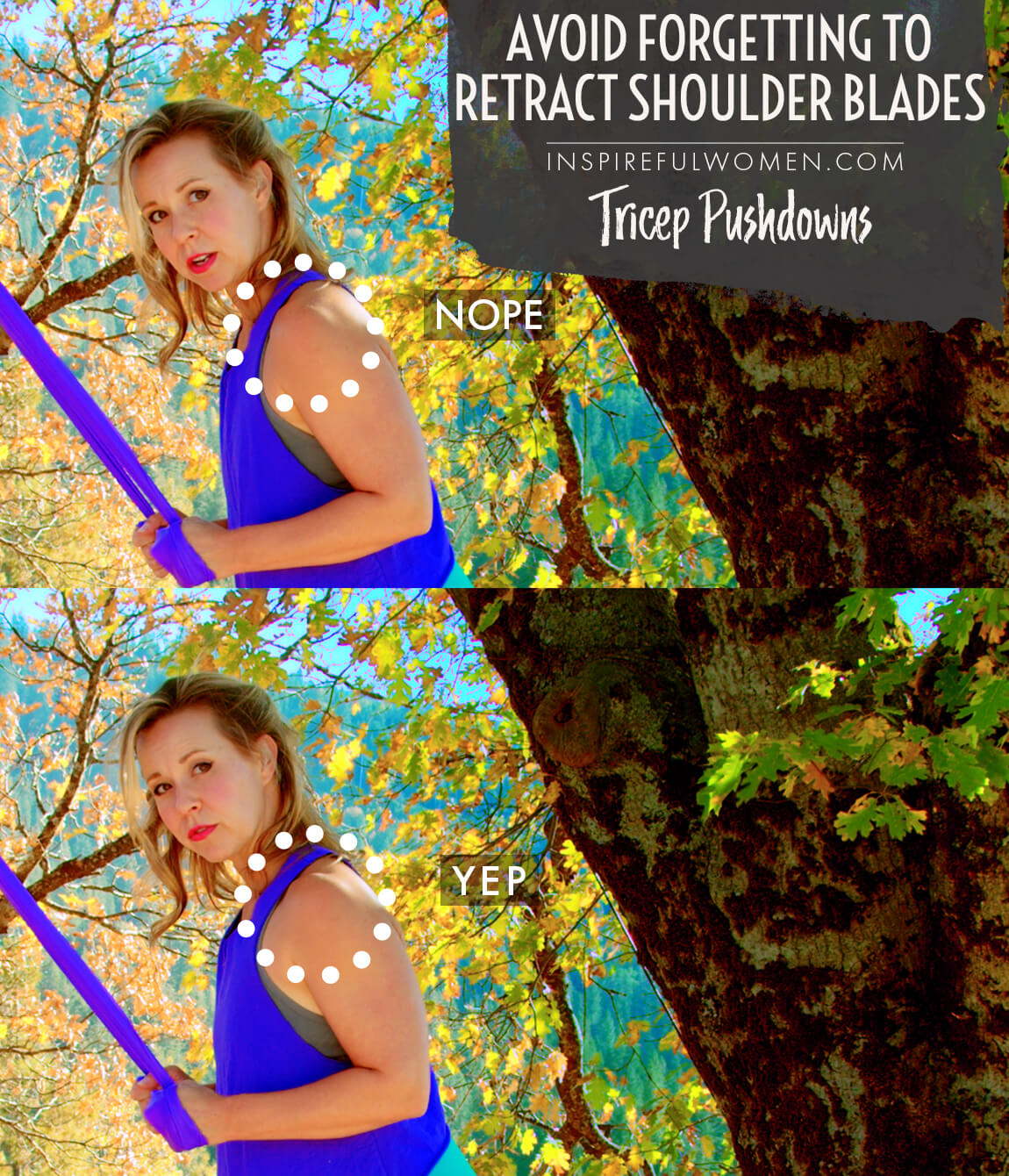
2. Avoid Elbows Coming Forward
AVOID: Letting elbows come forward
WHAT TO DO:
- Keep elbows in line with torso or just behind.
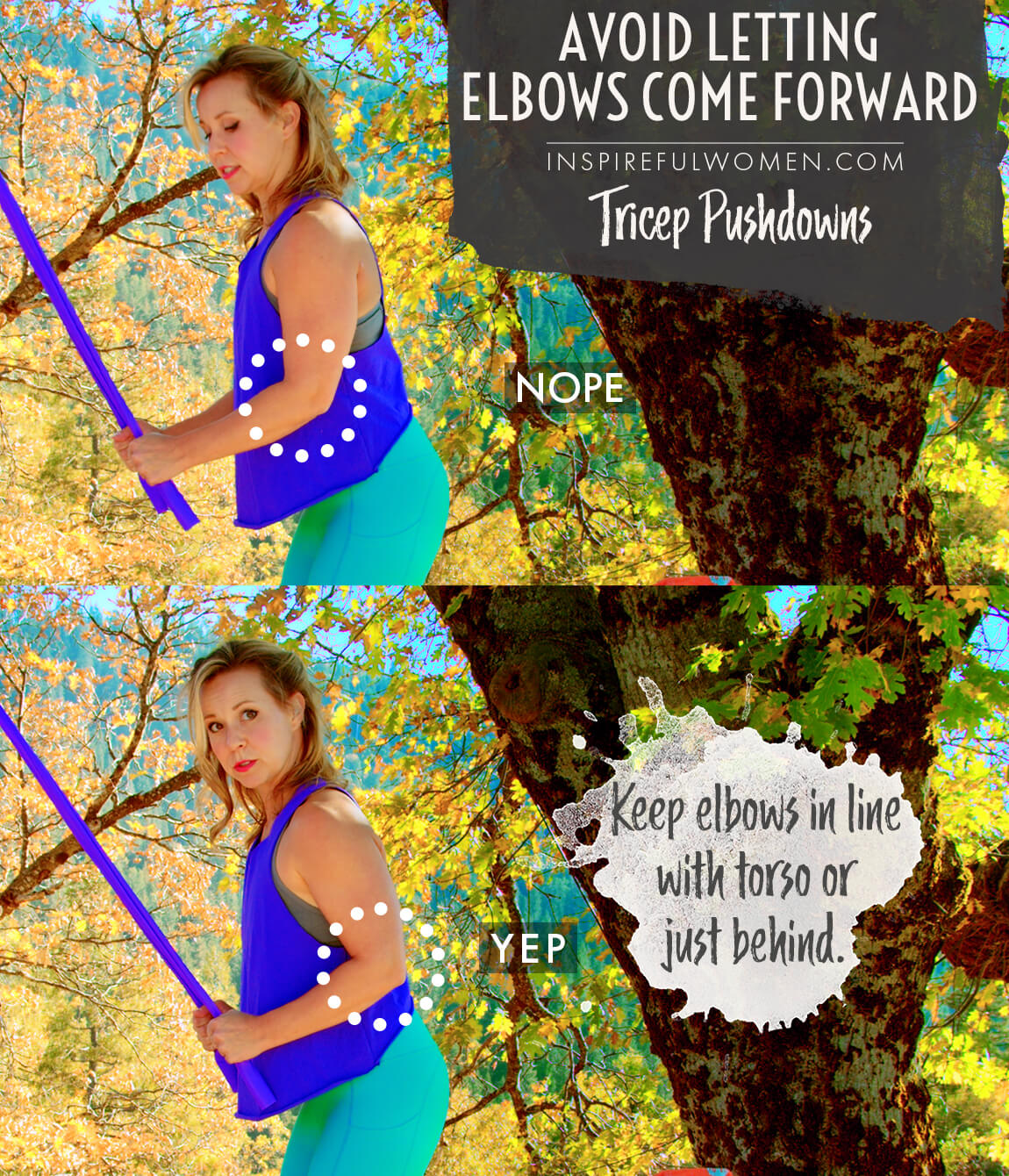
3. Avoid Elbows Moving Outwards
AVOID: Elbows moving outward or flaring out.
WHAT TO DO:
-
Keep upper arm at your side the whole time.
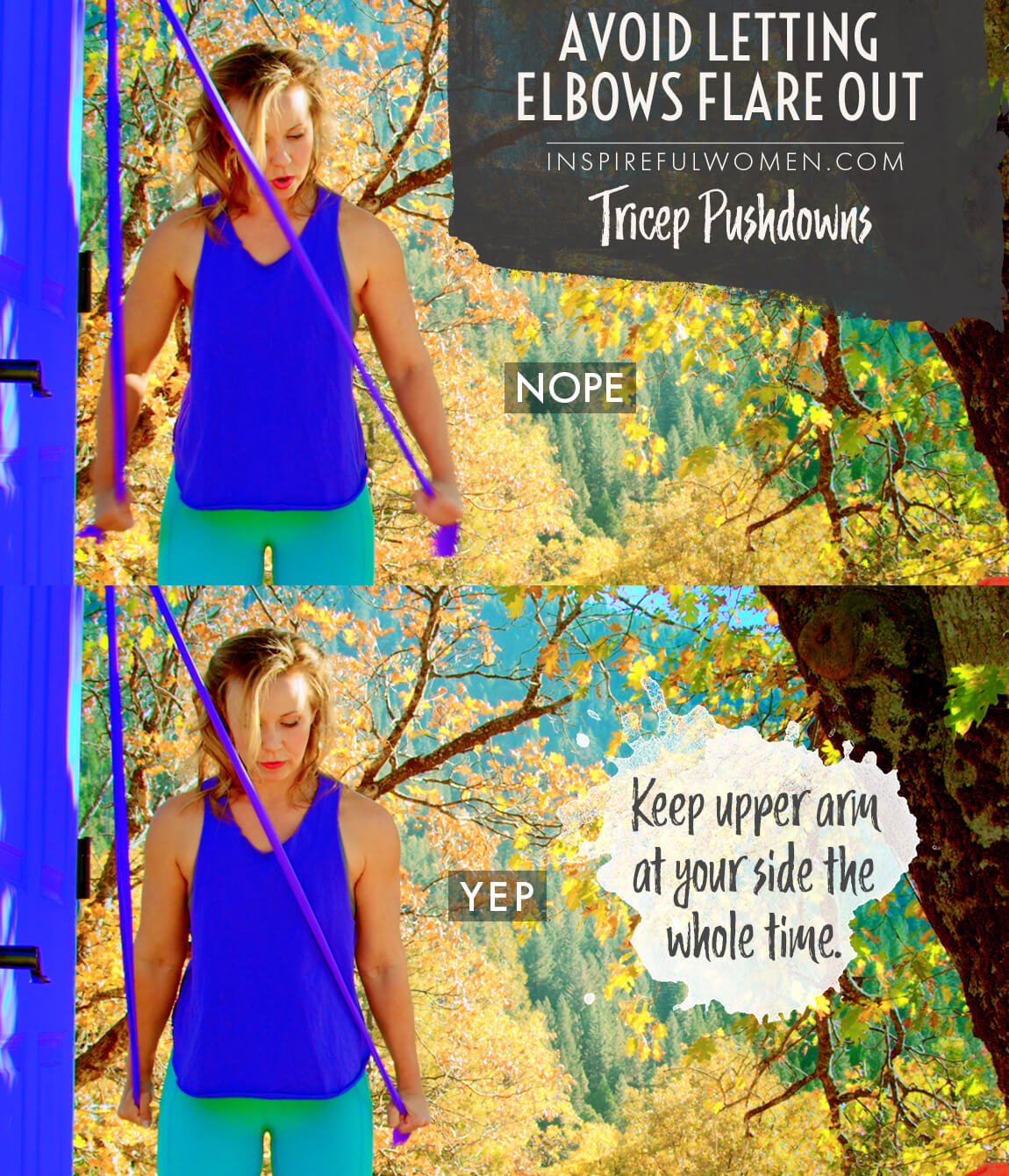
4. Avoid Upper Arms Moving
AVOID: Letting the upper arm move up and down.
WHY NOT?
- This activates the latissimus dorsi and teres major muscles and will decrease the activity of the triceps.
WHAT TO DO:
- Keep upper arms at your side.
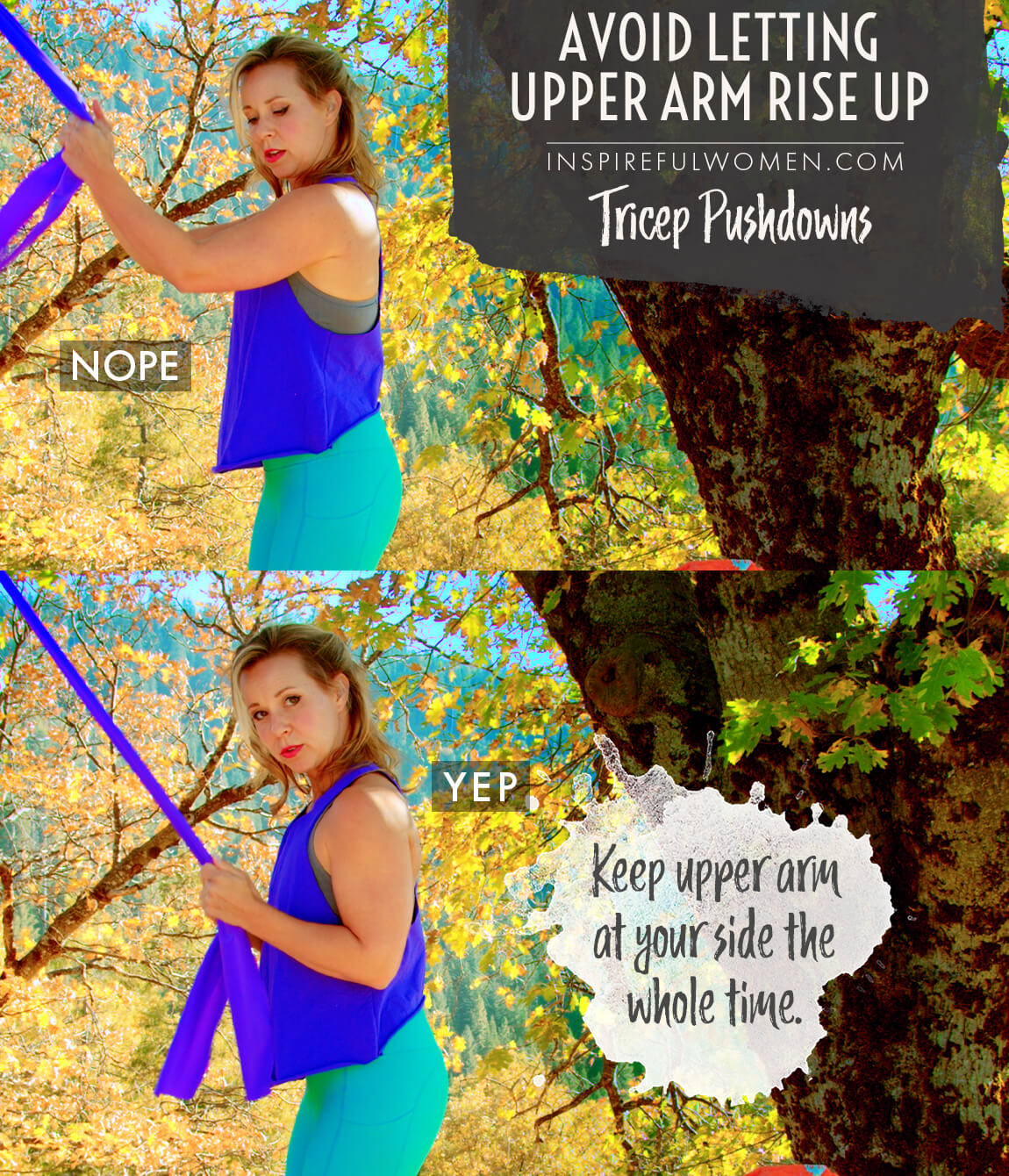
5. Avoid bending your Back
AVOID: Rounding your back.
WHY NOT?
- It is fairly common to round your back as you straighten your elbows and pull the band down.
WHAT TO DO:
- Keep your spine in neutral, shoulders back and down. Isolate the movement to just your elbow joints.
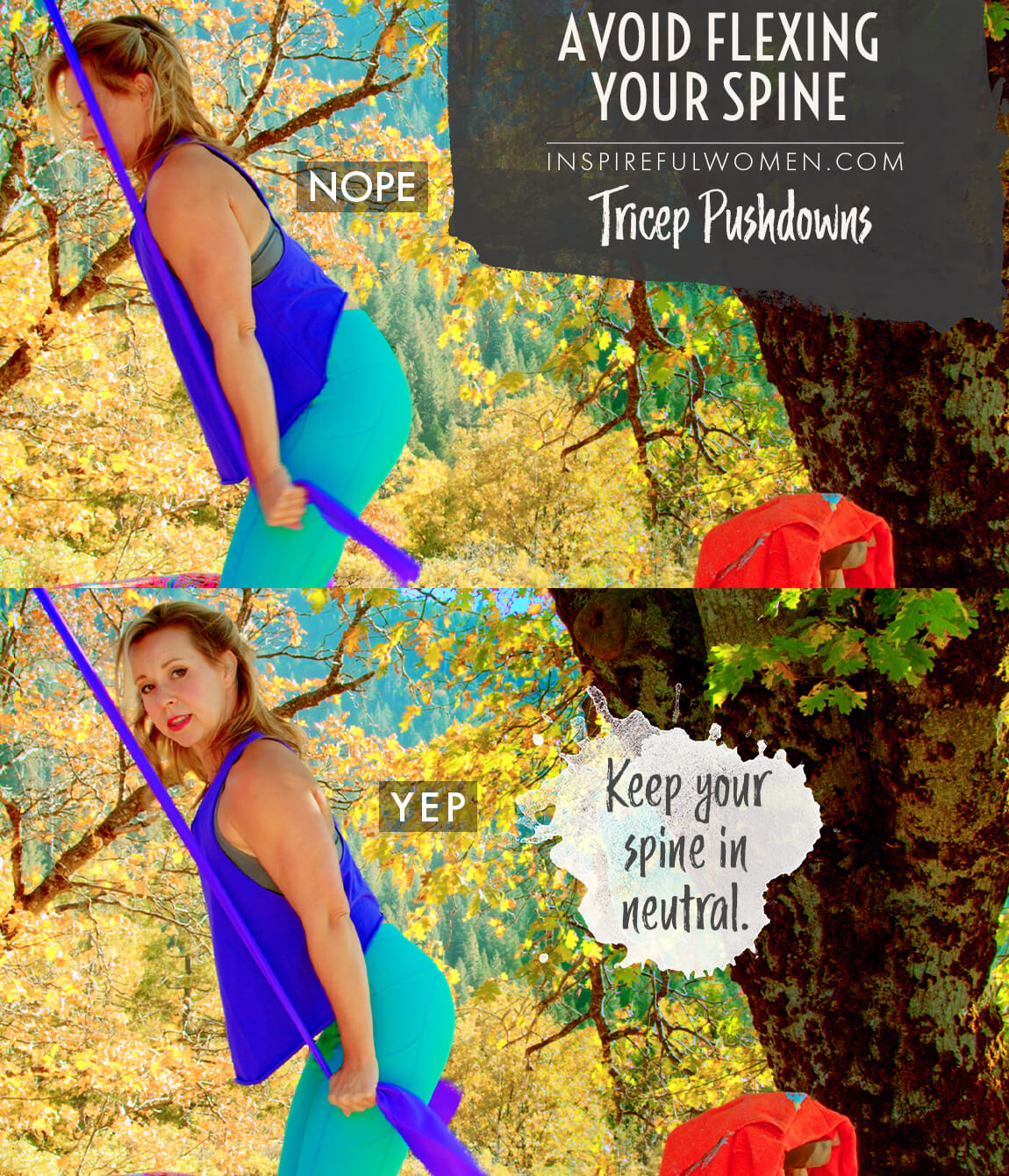
6. Avoid Shoulders Hunching Up To Ears
AVOID: Hunching the shoulders up towards your ears.
WHY NOT?
- This happens when the upper traps try to help.
WHAT TO DO:
- Reset the shoulder blades in and down the back.
- Bend the knees.
- Activate the abdominals.
- Consciously pull the shoulders down and relax the upper traps.
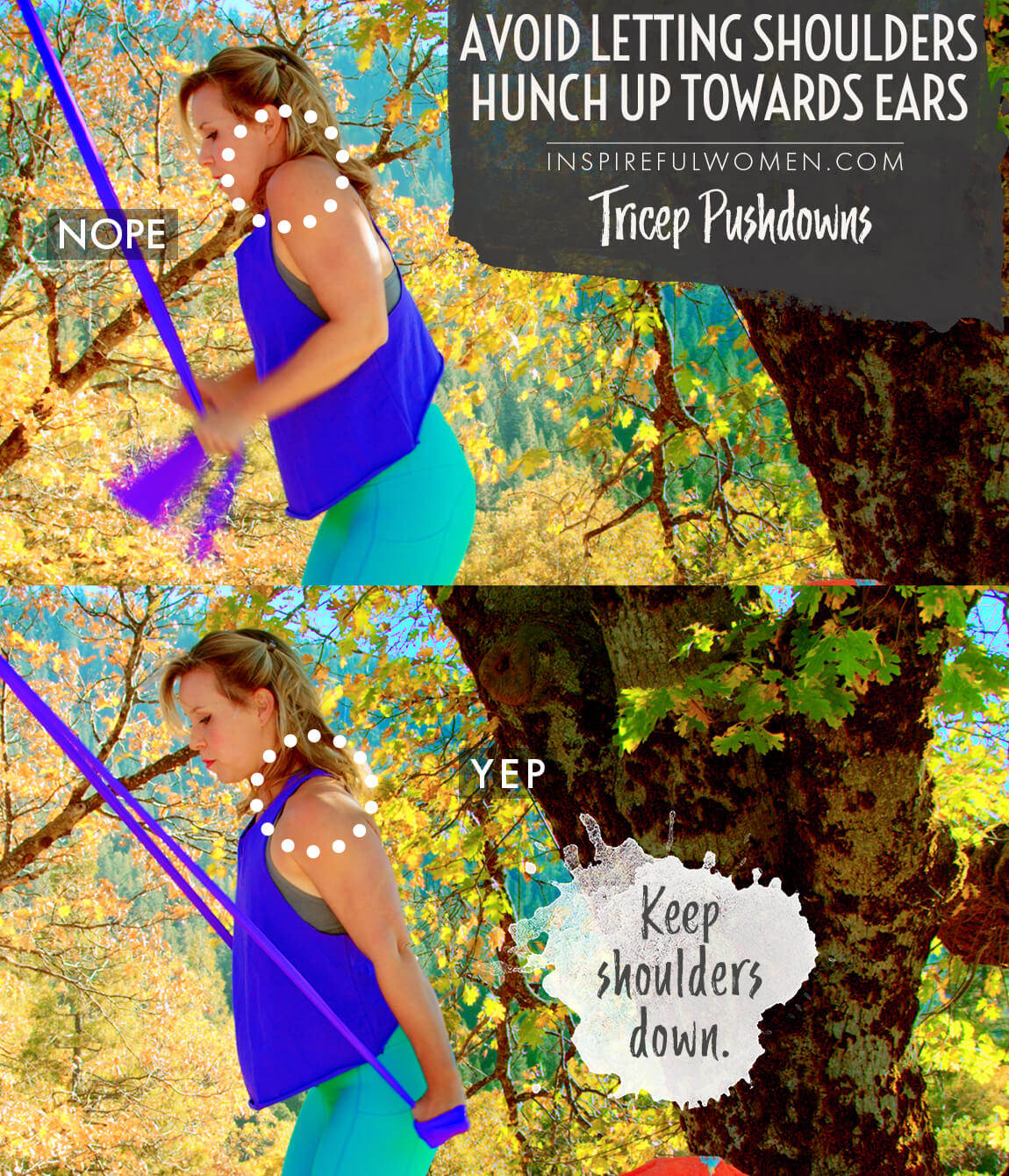
7. Avoid Moving Through Wrist
AVOID: Bending at your wrists.
WHY NOT?
- Poor alignment (bent forward or backward) or repetitive movement through the wrist can lead to joint and/or soft tissue irritation or injury over time.
WHAT TO DO:
- Your wrists should be in line with your forearm and should be still throughout the exercise.
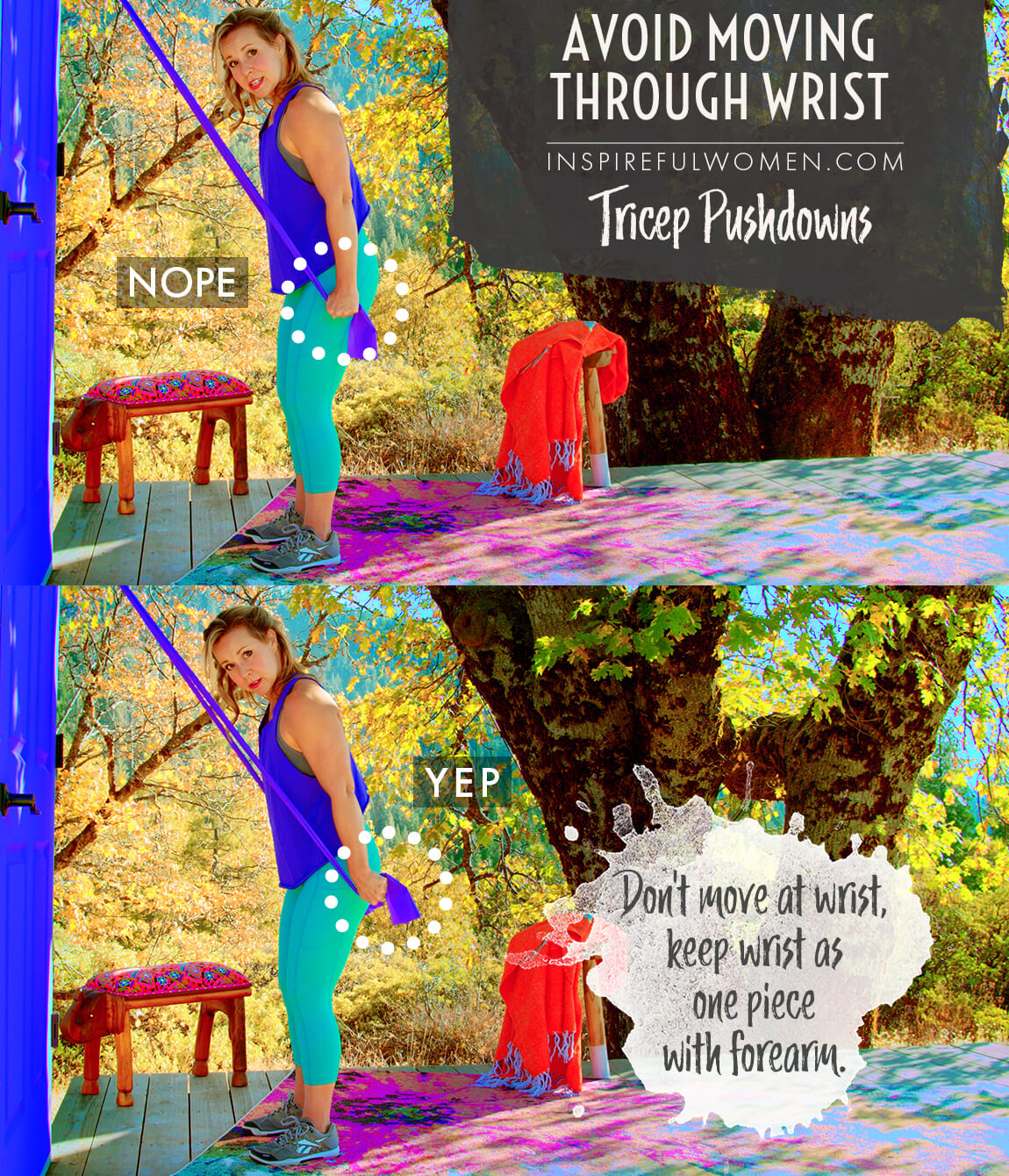
8. Avoid Stopping Short
AVOID: Stopping short of full range of motion
WHY NOT?
- The muscles will get weaker as your elbow straightens.
WHAT TO DO:
- Try to make sure that your elbows are straight at the end of the movement.
- This will work the muscle through a larger range of motion.
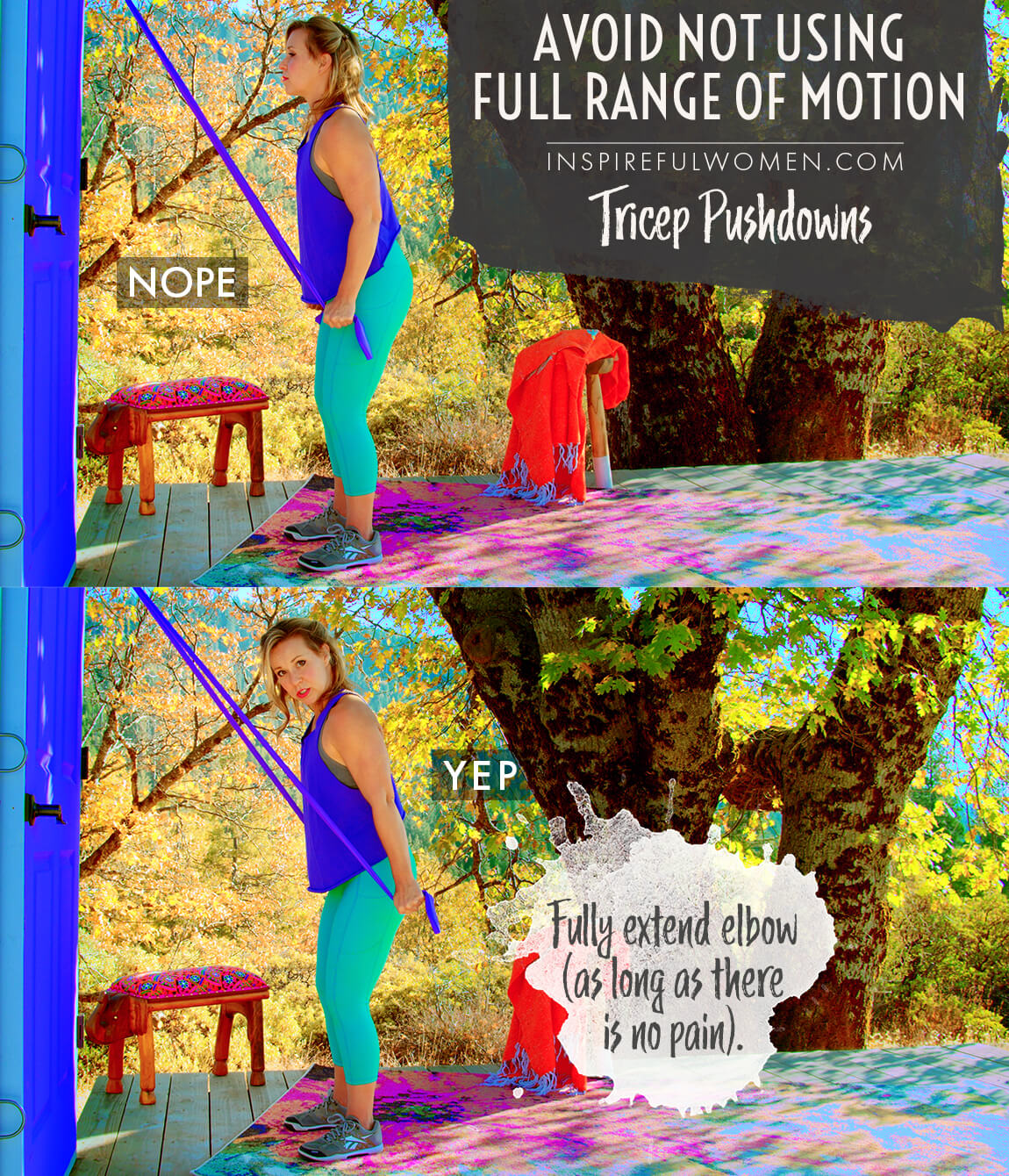
9. Avoid Hyperextension Of Elbows
AVOID: Hyperextending your elbows.
WHAT TO DO:
- Straighten elbows only till they are in line with your upper arm.
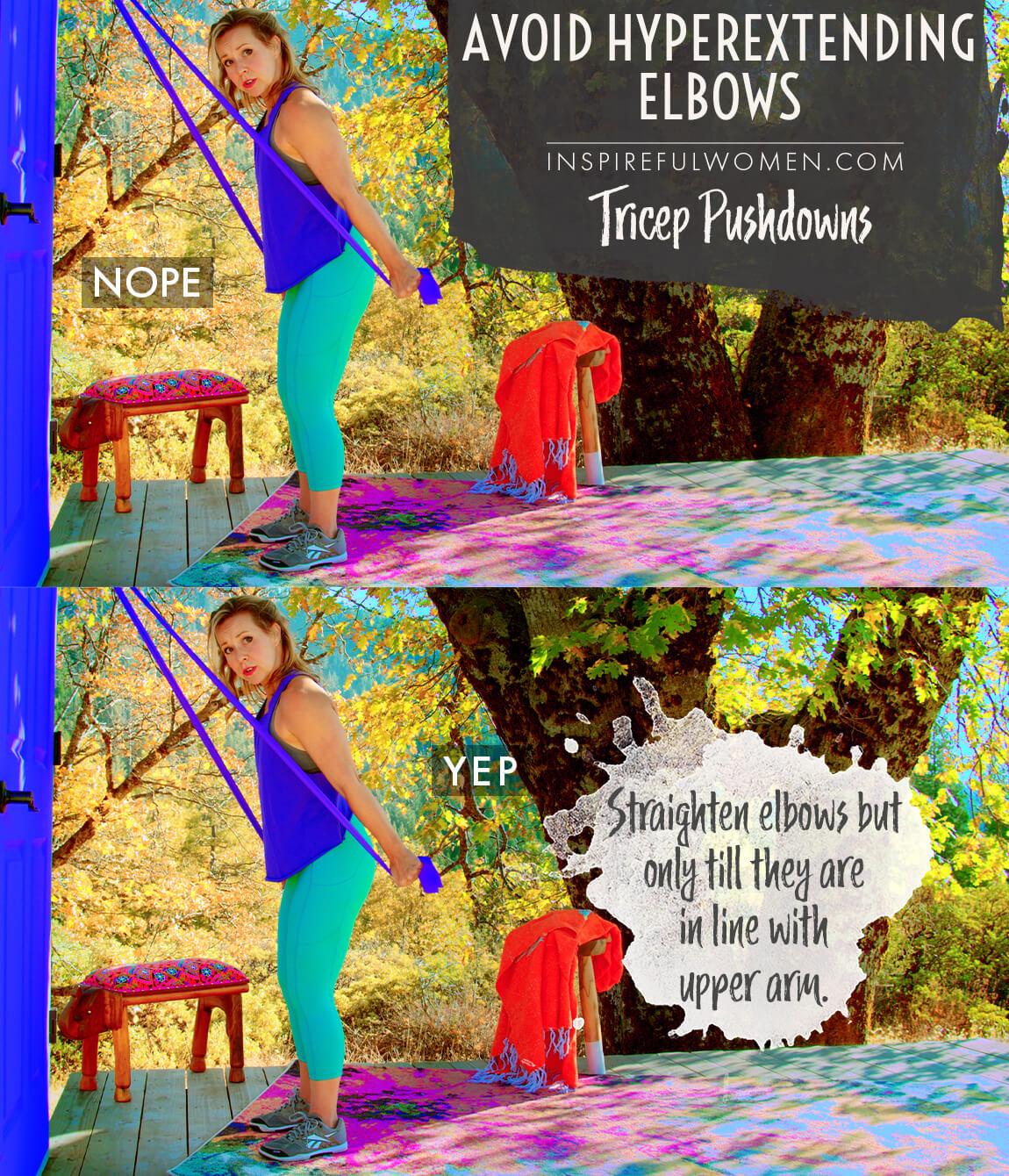
VARIATIONS
VARIATIONS
VARIATIONS OF Band Triceps Pushdowns
Mini Band Triceps Pushdown
Mini Band Triceps Pushdown
This is a good option if there is no way to securely anchor the resistance band. The non-working arm will hold one end of the mini band in place while the other arm works the triceps.
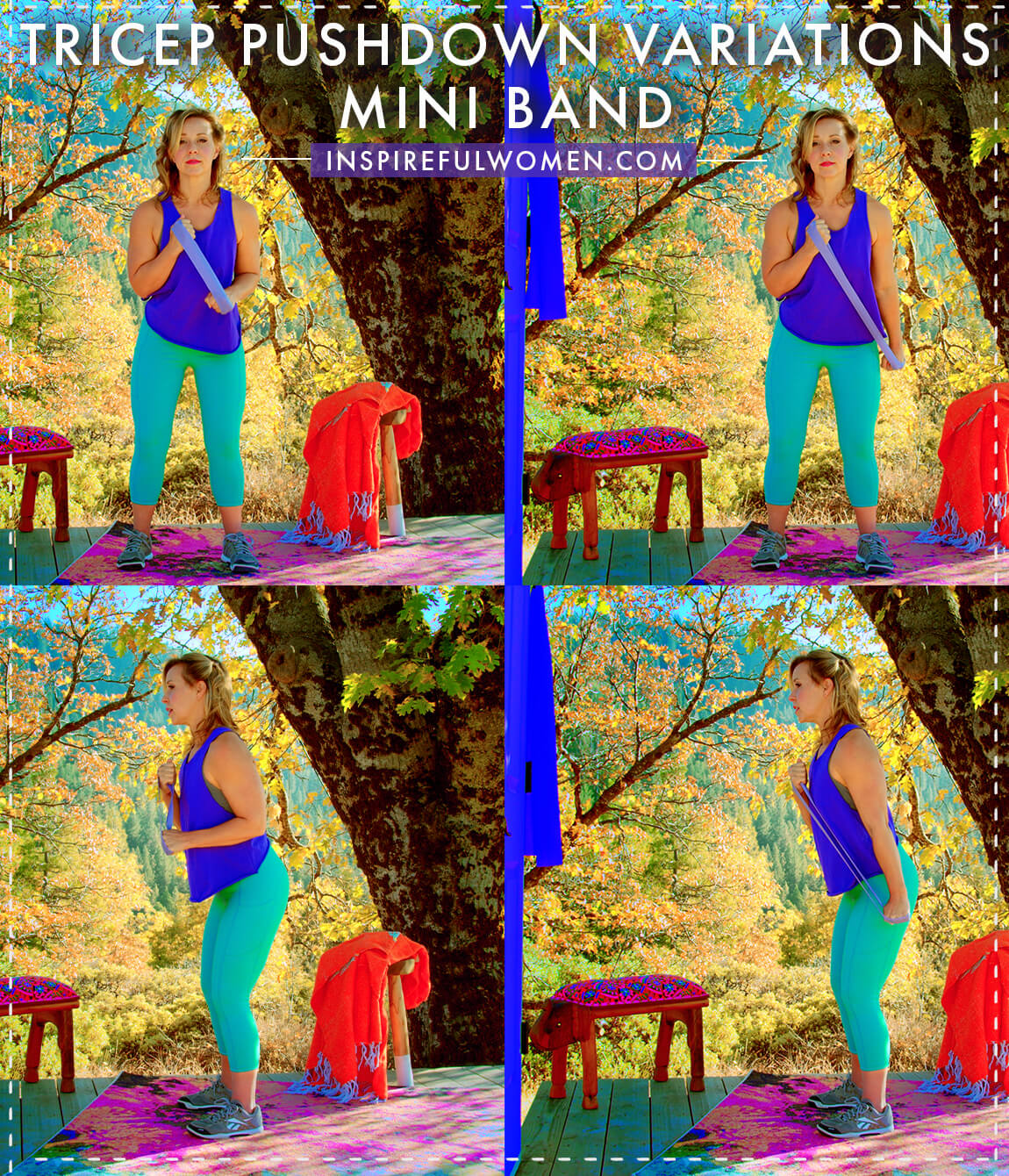
Kneeling Triceps Pushdown
Kneeling Triceps Pushdown
This variation can be used if your elastic band anchor is low. The kneeling position removes the legs so that they are not able to help stabilize.
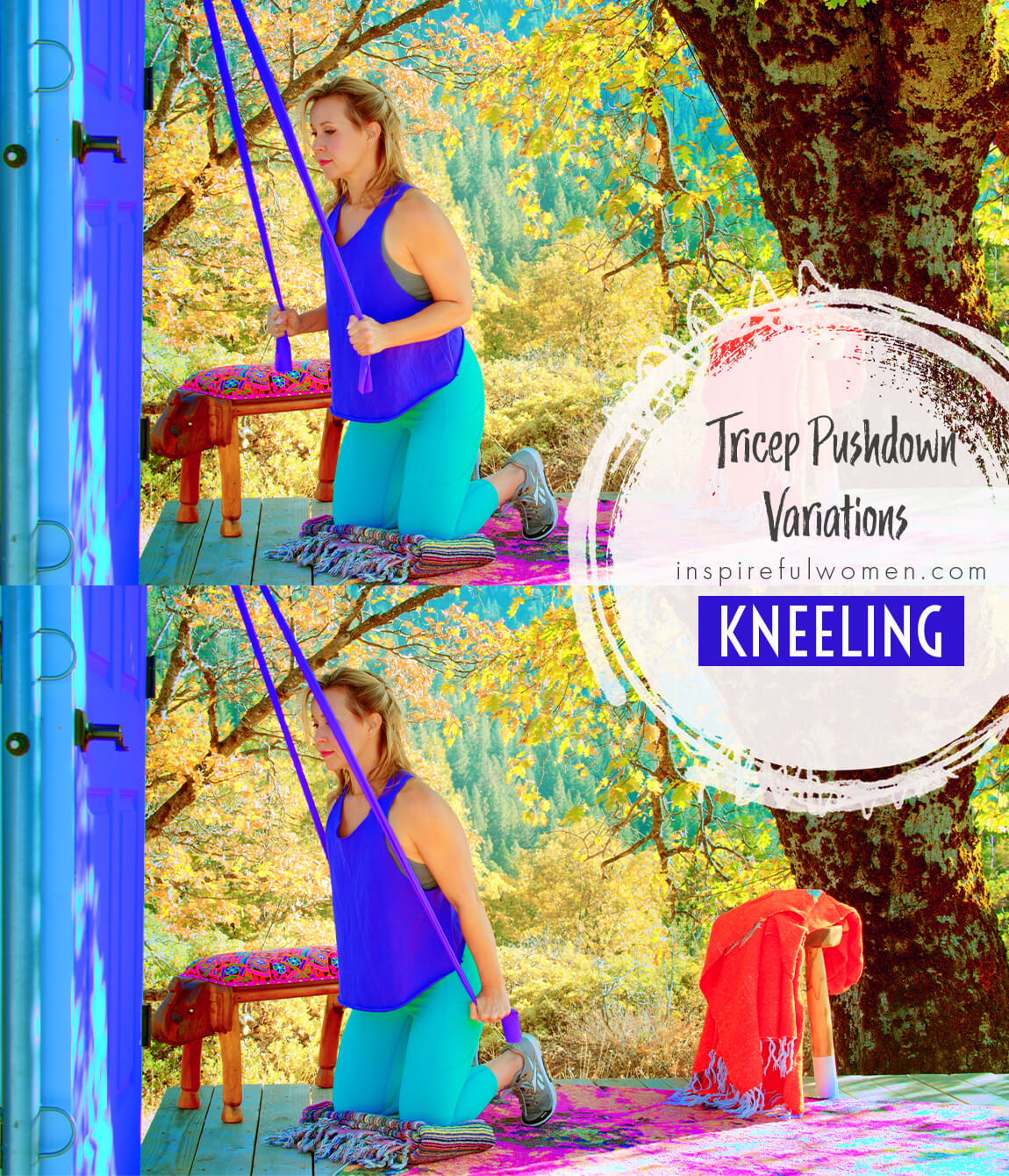
Half-Kneeling Triceps Pushdown
1/2 Kneeling Triceps Pushdown
This is another good option if your anchor is low, it is more stable than the tall kneeling position.
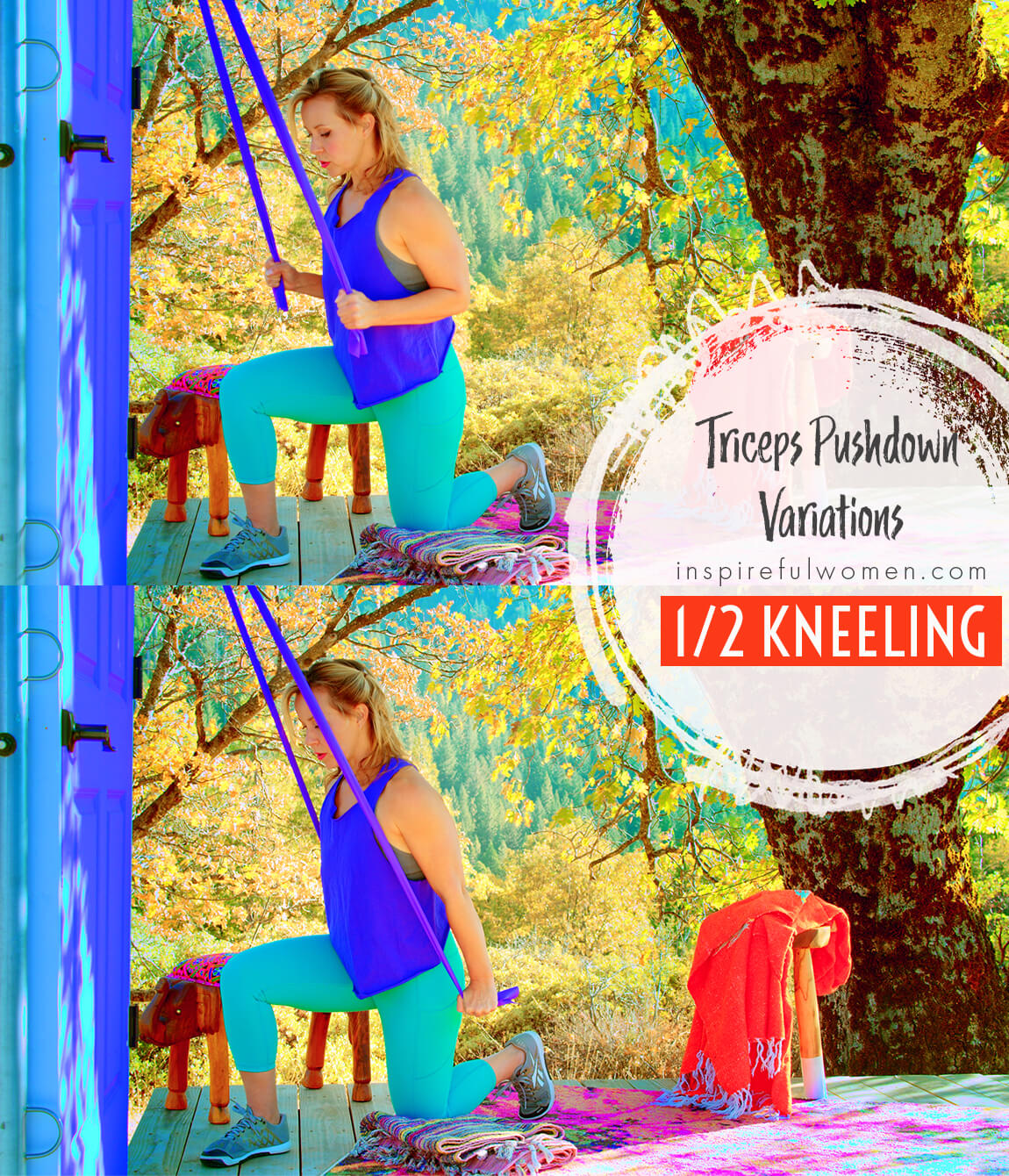
LYing Down Triceps Pushdown
Supine Floor Lying Triceps Pushdown
This is another good option if your anchor is low, it is more stable than the tall kneeling position.
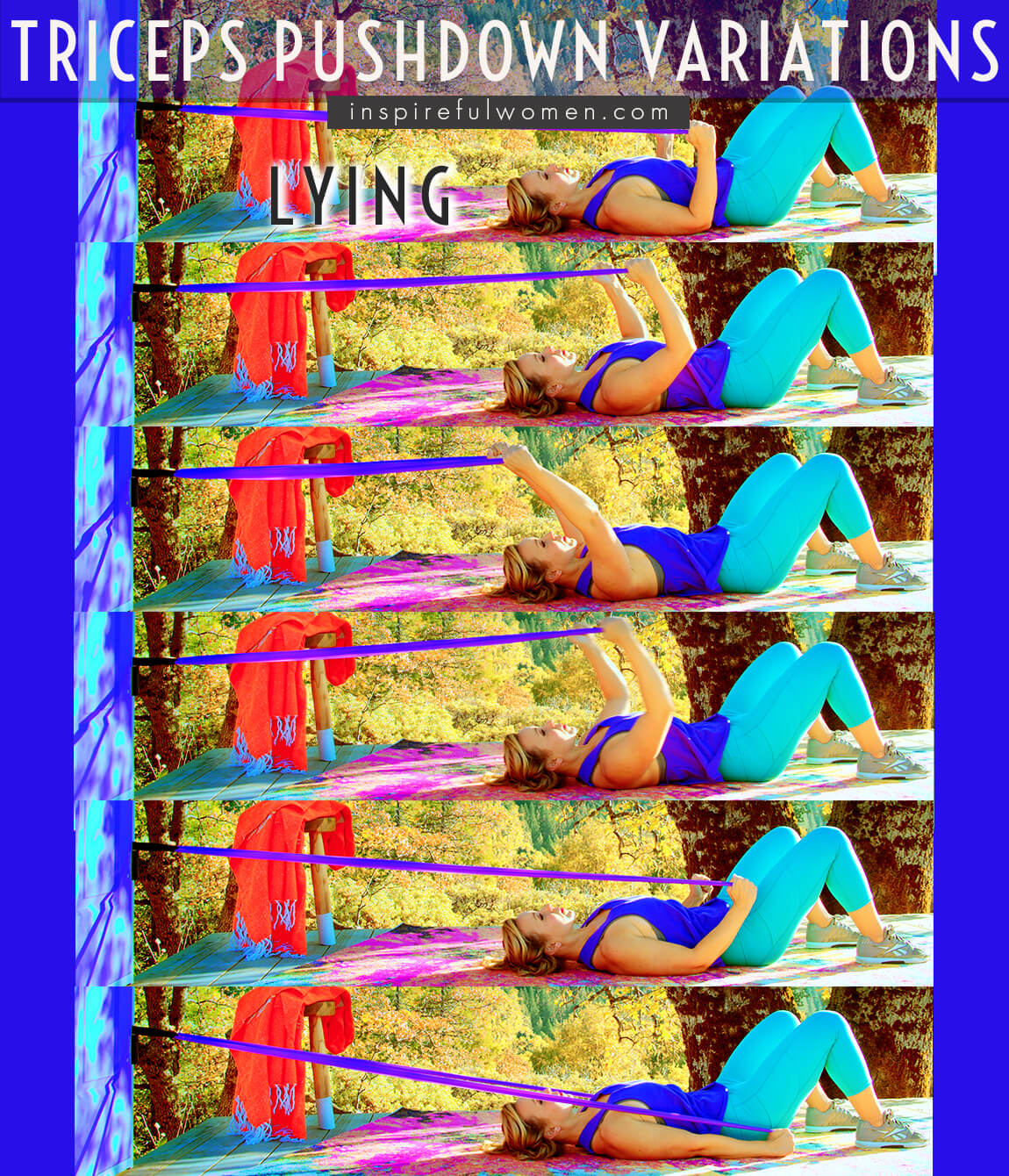
MAKE IT HARDER
HARDER
MAKING THE Band Triceps Pushdown MORE CHALLENGING
Single Arm
One Arm Tricep Pushdown
This version of the triceps push-down works one arm at a time to allow you to focus on feeling the triceps working and work the core stabilizers differently.
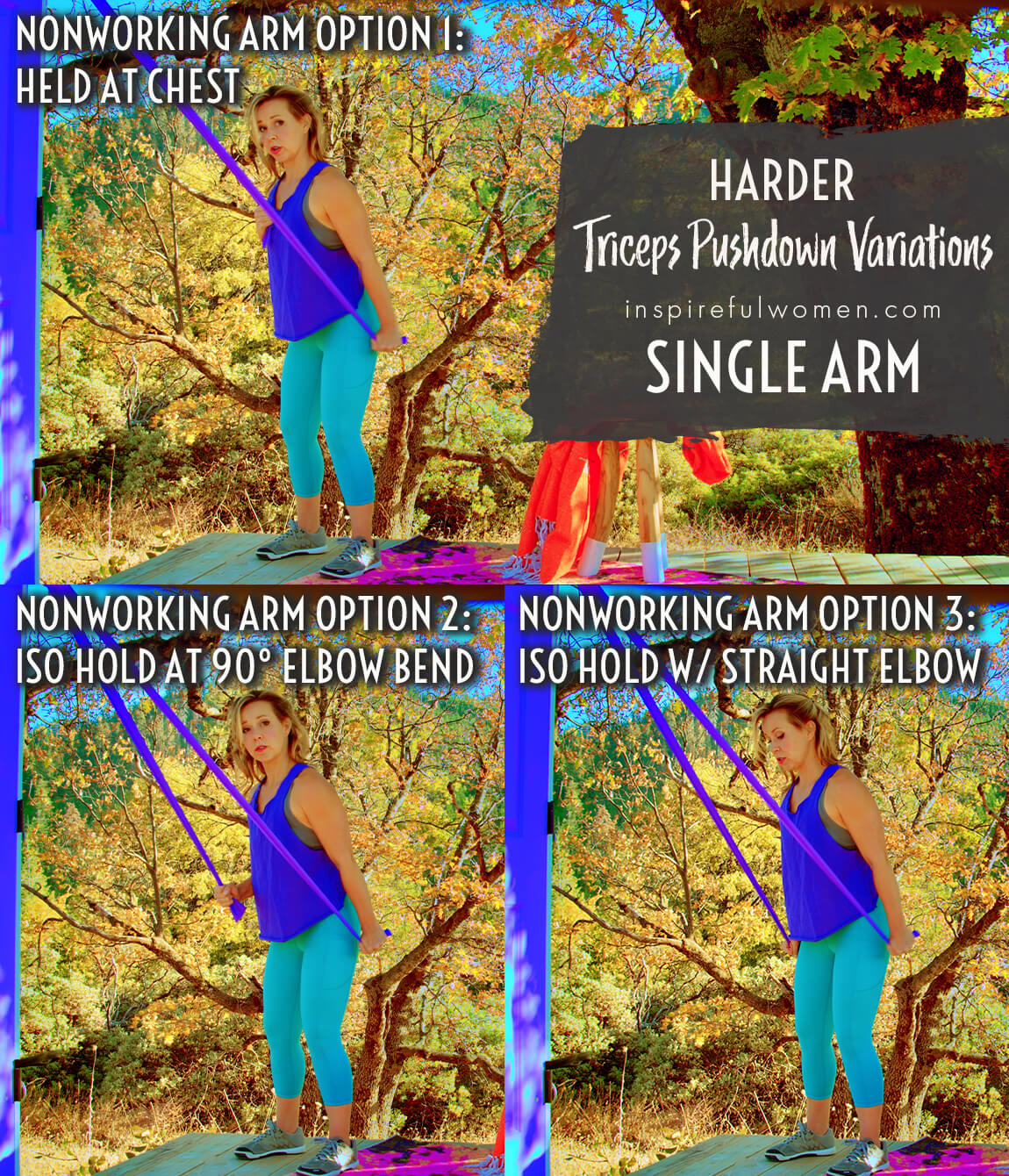
Isometric Holds
Iso Hold Triceps Pushdown
Isometric holds at ½ way through the movement and at the end of the movement.
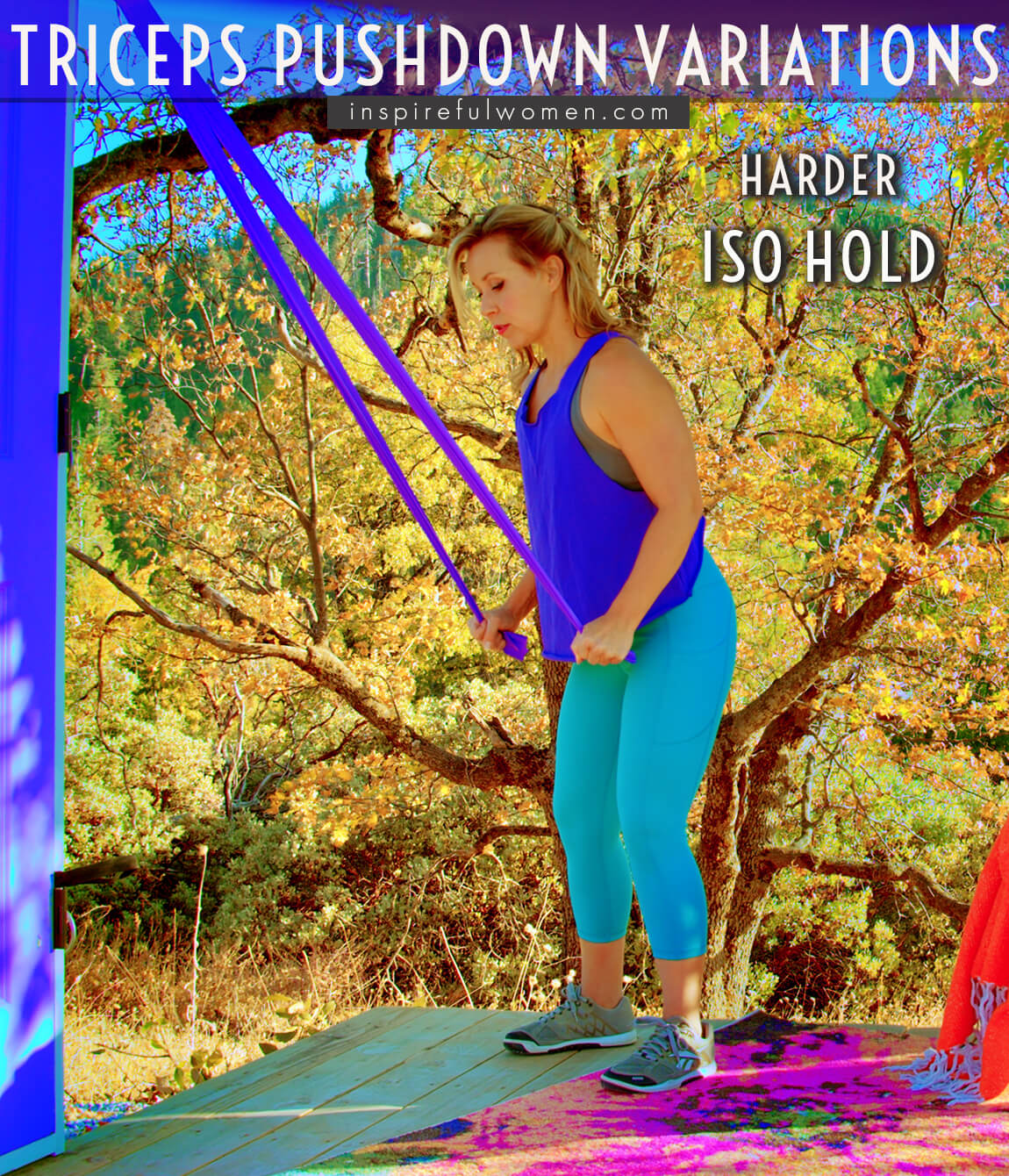
Double Resistance Bands
Double Up Bands Triceps Pushdown
Use 2 resistance bands.
21s Triceps Pushdown
21s Triceps Pushdown
Do 7 reps in the bottom half of range, 7 reps in top half, then 7 reps full range.
This option allows them to really work the muscle to fatigue at 3 different locations in the range of motion. A very thorough work out.
MAKE IT EASIER
EASIER
MAKE THE Band Triceps Pushdown MORE DOABLE
One Arm
Single Arm Triceps Pushdown
Working one arm at a time will make it easier to use more resistance because the core muscles will only need to stabilize against the pull of one arm at a time.
Alternating Arms Each Rep
Alternating Arms Triceps Extension
Complete one rep on one side, bend the elbow to release the tension on the band and then complete one rep on the other side. This will challenge the core muscles differently - they will need to activate and relax in a coordinated fashion to maintain stability. It will also allow one arm a bit of a rest between reps. You can increase the level of difficulty by completing the tricep extension on one side, holding the arm in the end position and then completing the extension with the other arm before releasing the first arm, then the second.
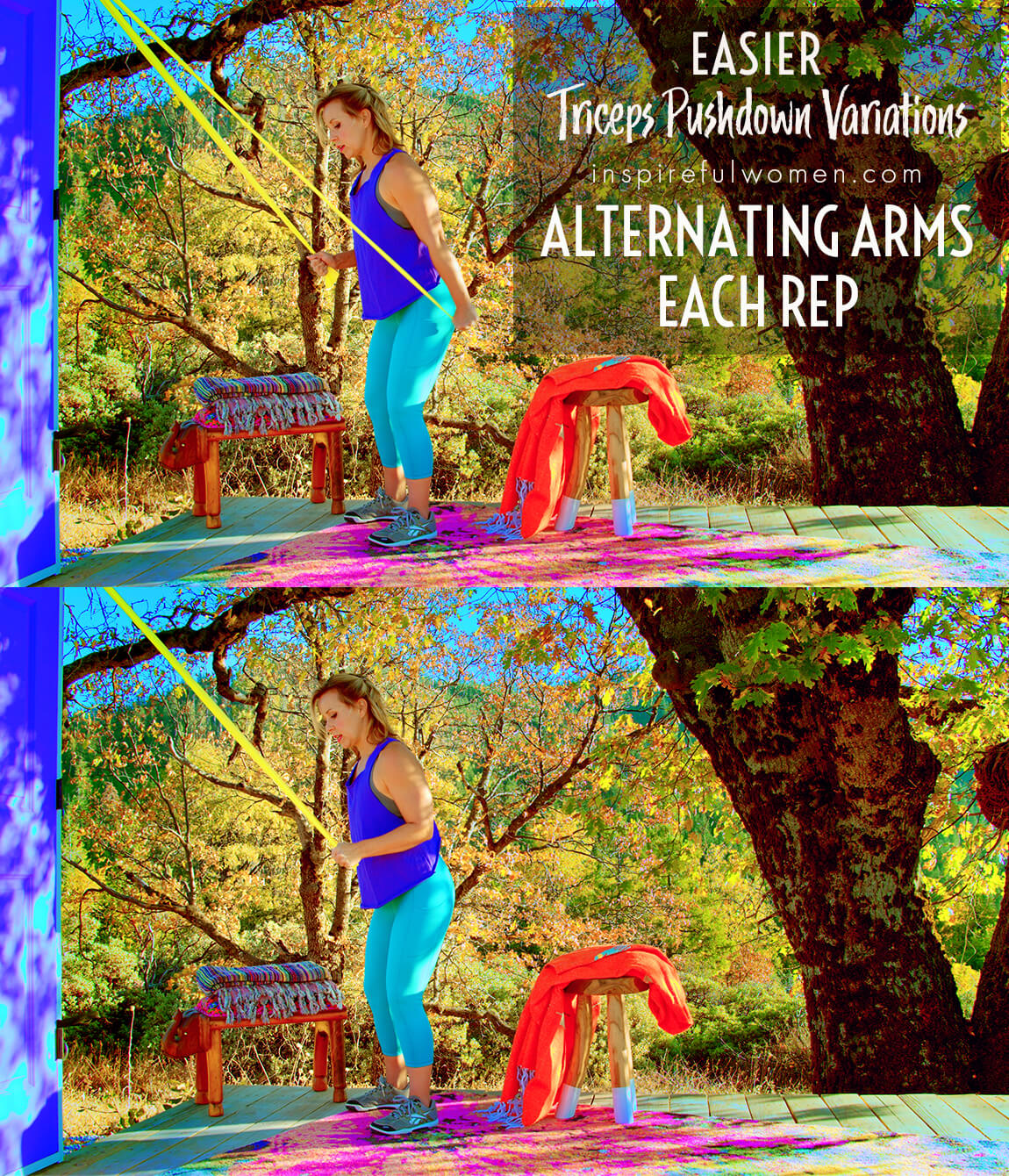
Different Positioning
Play with Positioning Triceps Pushdown
Half Kneeling
1/2 Kneeling Triceps Pushdown
This is a more stable position.
Seated Triceps Pushdown
Seated Triceps Pushdown
Being seated allows you to focus on working the upper body muscles in a stable and safe position.

Ball Triceps Pushdown
Swiss Ball Triceps Pushdown
Seated on a ball.

Stepback
Stepback Tricep Pushdown
Complete the concentric phase of the exercise with both arms. With both elbows straight and hands by your side, take a step back to increase the resistance of the band. Slowly bend the elbow back to 90 degrees (eccentric contraction) under the heavier load. Step forward and repeat.
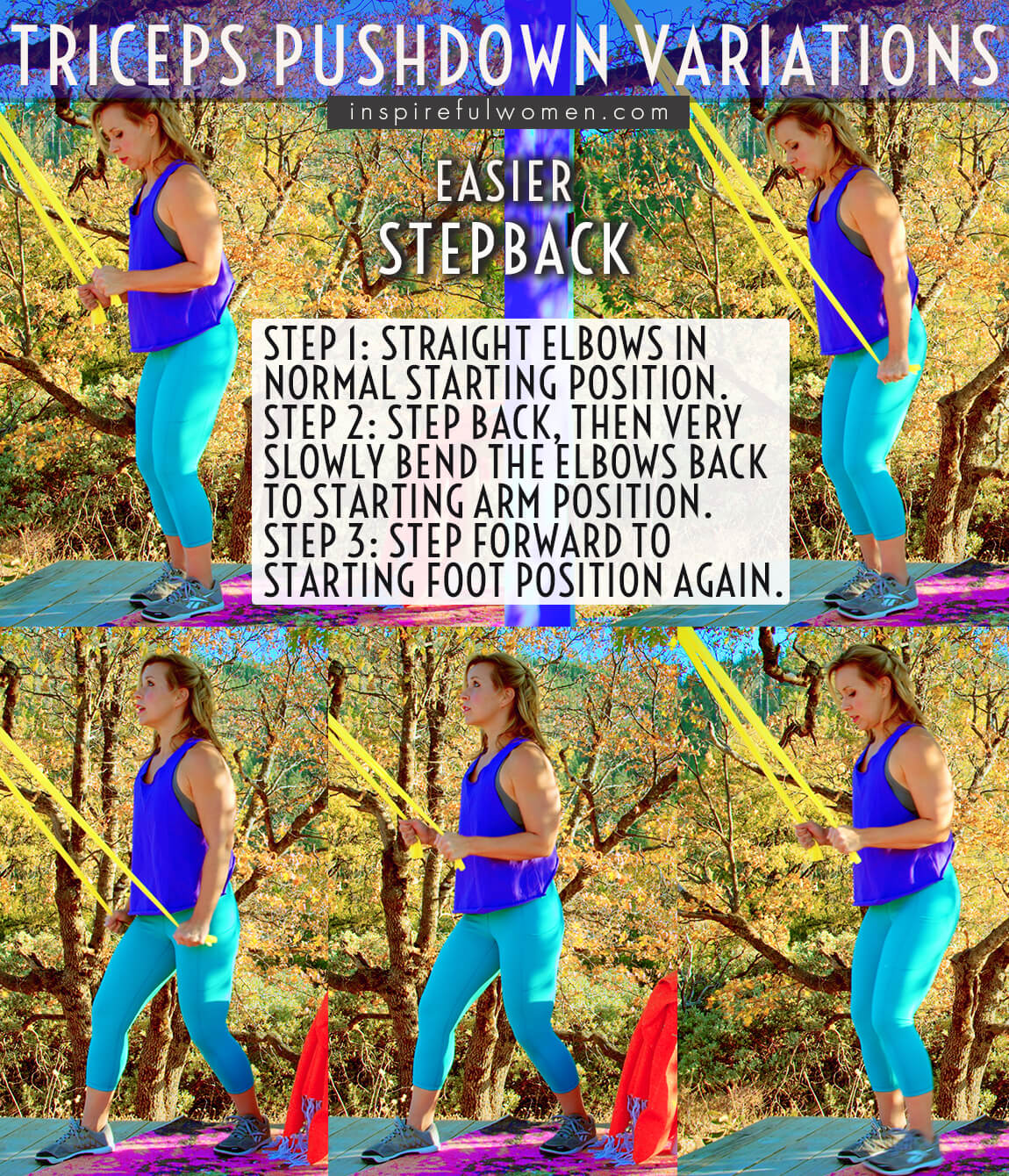
SCIENCY STUFF
ALLLL MUSCLES & WHEN
ALL MUSCLES WORKING & WHEN DURING THE Band Triceps Pushdown
The core and scapular stabilizers work to hold the spine in a neutral position throughout the exercise.
The long head of the triceps, the lats (latissimus dorsi), and the teres major work isometrically to hold the upper arm just slightly behind (extended) and close to the body (adducted) to provide a stable base for the triceps to work off of. All three heads of the triceps and the anconeus contract concentrically to straighten the elbow joint. The muscles of the forearm work to hold the wrist in a neutral position. The triceps and anconeus contract eccentrically to control the movement as the elbow bends and returns to the starting position.
PIN IT FOR LATER!
